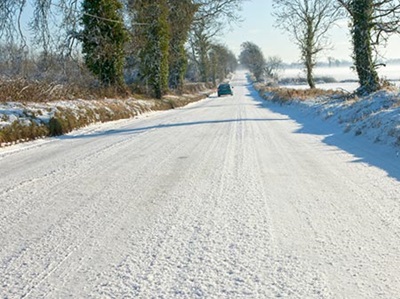Severe weather
Advice for Irish road users when severe weather strikes.
Coming into the Winter months, it's important to be ready for extreme weather so please familiarise yourself with our road safety advice below. We also explain the weather warning system and offer tips for driving in poor conditions.
Check if your test centre is affected. Real time updates. Your safety is our priority. What to do if it's unsafe to travel. How to cancel your driving test.
Severe weather advice
In our videos below, RTÉ news reporter, Teresa Mannion gives advice for driving in severe weather conditions such high winds, heavy rainfall, and freezing temperatures. She also explains Ireland’s severe weather warning system.
Be winter-ready
The government’s ‘Be Winter-Ready’ campaign provides advice on how to prepare for winter.
Download and read the Be Winter-Ready booklet below or visit www.winterready.ie from the Office of Emergency Planning (OEP).
You can contact the OEP at:
- LoCall: 1890-252736
- Email: [email protected]
- Follow the Office of Emergency Planning on twitter

Is your journey necessary?
In extreme weather conditions ask yourself if making a journey by road is necessary? If it is not, you might consider delaying your trip until the weather and road conditions improve. If using the roads in such conditions is unavoidable be prepared. The golden rule is to drive, cycle or walk with extreme care and caution and expect the unexpected.
Is your vehicle ready for winter?
As the saying goes ‘Prevention is better than cure’, so take some time to prepare both your vehicle and yourself for the challenges of winter driving. Don't get caught out when severe weather strikes!
You should:
- get your vehicle serviced to make sure it is fit and safe for winter driving. You should also carry out regular walkaround checks on the vehicle
- check for wear and tear on wiper blades and replace them as soon as they start to smear rather than clean windows
- keep tyre pressure at the manufacturer's recommended level and check you have at least three millimetres of tread depth
- check that your spare wheel is in good condition and is fully inflated. Some cars may have an inflation repair kit instead of a spare wheel. Make sure that you know how to use it
- make sure all vehicle lights are working and clean
- top up with anti-freeze and screen wash.
Advice for vulnerable road users
During periods of severe weather consider postponing your journey. If the journey is unavoidable, please see the advice below.
Advice to pedestrians, cyclists and motorcyclists:
- Visibility and light is reduced in poor weather conditions. Keep safe by making sure you can be seen. Wear bright clothing with reflective armbands or a reflective belt
- Carry a torch in snowy conditions and wear clothing that does not restrict your vision.
- Take extra care when crossing the road or cycling in extremely windy conditions as a sudden gust of wind could blow you into the path of an oncoming vehicle.
- Walk on a footpath, where possible and not in the street. If there is a footpath and it is safe to use, look out for falling debris from above, especially in urban areas.
- In snowy and icy conditions wear appropriate footwear. DO NOT underestimate the danger of ice.
- Many slips and falls happen in places people regard as safe and secure, typically outside their front door, on the doorstep, on the path or while getting out of the car. When you approach a footpath or roadway that appears to be covered with snow or ice, always use extreme caution.
- Walk on the right-hand side of the road, facing traffic if there are no footpaths.
- Cyclists should ensure that they and their bike are visible to other road users by investing in a good set of front and rear lights (white at the front, red at the back) and by wearing clothes that help you be seen on your bike such as bright and light reflective items.
- Motorcyclists should make sure to wear protective equipment and high visibility clothing to make sure they can be seen.
- Motorcyclists should avoid wearing a dark visor in any bad light conditions.
Useful links
- Visit the Department of Transport for updates on public transport.
- Tune in to your local radio station to get latest updates in your county.
- Check the weather at Met Eireann.
- For updates on conditions on motorways and national roads visit the TII website .
- Check the garda website for travel warnings.
- For updates on the latest traffic news visit AA Roadwatch.
- Check for live weather and garda updates as you travel – but remember not to use your phone while driving.
- Check your local authority website for updates.
Severe weather radio
Our radio ads offer advice on preparing for and driving in severe weather.
Useful documents
Download and read our helpful leaflets and booklets for road users in severe weather.
Top 10 Tips Driving in snow and ice pdf | 207 KB Top 10 Safety tips to avoid slips and falls in ice or snow pdf | 14 KB Top 10 Safety tips for driving during thaw pdf | 13 KB Top 10 Safety tips for floods and wet and windy conditions pdf | 19 KB Acting responsibly in snow and ice pdf | 78 KB Advice for pedestrians, cyclists, motorcyclists in snow and ice pdf | 184 KB Severe weather advice for road users (Eng) pdf | 463 KB Comhairle D’úsáideoirí bóthair le linn droch aimsire pdf | 946 KB



.tmb-.jpg)


.tmb-.jpg)

/rsa-speeding-web-banners-384x207.jpg?sfvrsn=60a6a2d2_3)
/rsa-80_60k_slowsign_1x1-english.jpg?sfvrsn=3551b5af_3)



.jpg?sfvrsn=bfcc0a5d_3)

